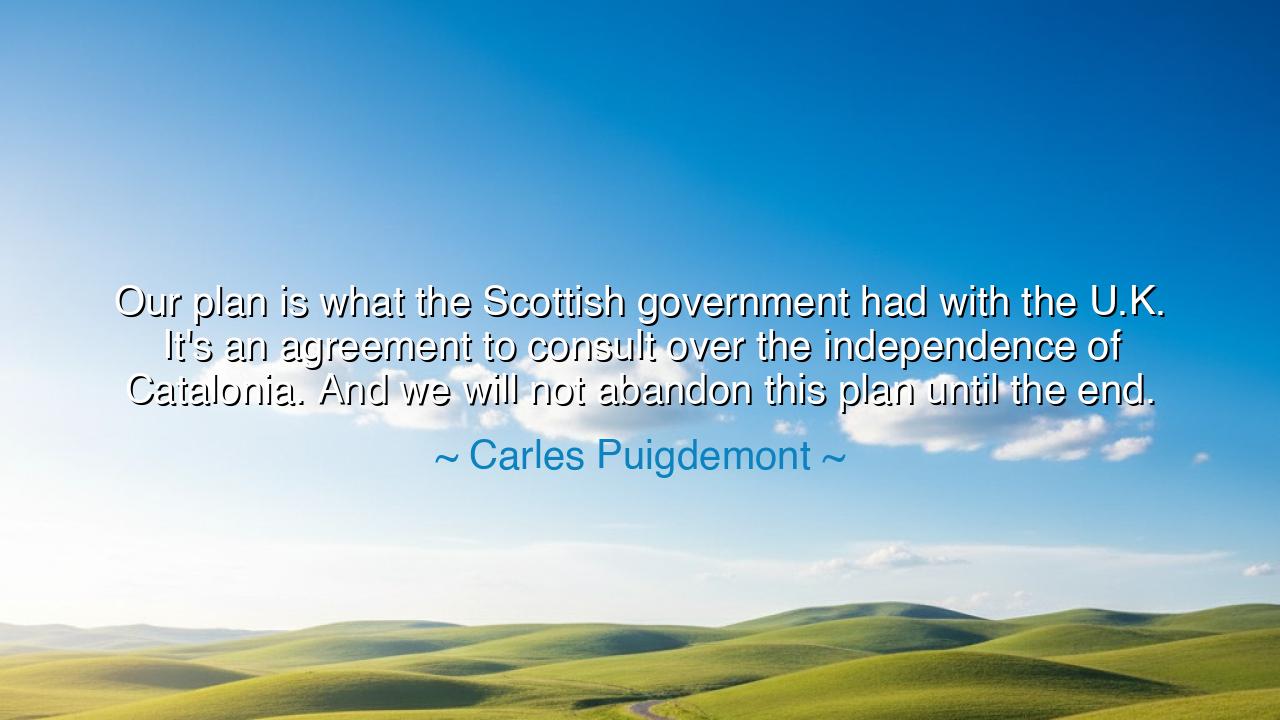
Our plan is what the Scottish government had with the U.K. It's
Our plan is what the Scottish government had with the U.K. It's an agreement to consult over the independence of Catalonia. And we will not abandon this plan until the end.






“Our plan is what the Scottish government had with the U.K. It's an agreement to consult over the independence of Catalonia. And we will not abandon this plan until the end.” Thus spoke Carles Puigdemont, the Catalan leader whose voice carried the longing of a people divided between loyalty and liberty. His words rise not as a threat of rebellion, but as a vow of perseverance — a promise that self-determination, once awakened, cannot be silenced by decree or delay. In his declaration lives the eternal tension between the governed and the governors, between those who seek to preserve unity and those who seek the sacred right to choose their own destiny.
To understand this saying, we must journey to Catalonia, a proud and ancient region of Spain, whose culture, language, and spirit have long carried the mark of distinction. For centuries, its people have walked the narrow path between belonging and independence — woven into the tapestry of Spain, yet dreaming of their own sovereign thread. Puigdemont, who led the Catalan government in the years surrounding the 2017 independence referendum, stood at the heart of this dream. His words refer to Scotland’s agreement with the United Kingdom — a lawful, democratic consultation that allowed the Scottish people to vote on their future in peace and dignity. Puigdemont’s vision was for Catalonia to follow that same path: to seek freedom not through blood or violence, but through dialogue and democratic will.
His statement, “we will not abandon this plan until the end,” carries the weight of a warrior’s oath, though it speaks of ballots, not swords. It echoes the voice of countless leaders before him — men and women who refused to surrender their people’s right to be heard. For Puigdemont, the “agreement to consult” is not merely a political act; it is an act of faith in the principle that a nation’s legitimacy flows from its people. To him, independence is not just a boundary drawn upon a map, but the full expression of identity, history, and hope.
The ancients, too, knew this yearning. In the days of Athens, the philosopher Pericles proclaimed that true freedom lies in the ability of citizens to decide their own fate. When the city was threatened, he did not fight for conquest, but for the preservation of that self-rule — the same ideal that Puigdemont invokes for Catalonia. And like Athens under the shadow of empire, Catalonia has often found itself struggling not against foreign chains, but against the invisible bonds of central power — those subtle forms of domination that bind not with iron, but with laws and fear.
History offers another mirror: the story of Scotland itself. In 2014, after long negotiation and debate, the Scottish government secured an agreement with London to hold a referendum. Though the vote did not bring independence, it did bring something equally sacred — the recognition that a people have the right to speak for themselves. That process, peaceful and lawful, became a beacon to other regions seeking similar paths. Puigdemont’s quote reflects this same aspiration for dialogue, for an outcome not forced by rebellion, but chosen by consensus. Yet when his own attempt to hold a vote in Catalonia met resistance from Madrid, it revealed how fragile the path of democratic independence can be when power refuses to listen.
But Puigdemont’s words are not only for Catalonia — they are for all who have felt the pull between unity and freedom, between tradition and transformation. His plan represents more than political maneuvering; it is a moral conviction that the will of a people cannot be suppressed forever. He speaks with the voice of those who remember that history bends not toward the silence of authority, but toward the courage of persistence. Whether his plan succeeds or fails, his resolve embodies the essence of human dignity — to seek one’s rightful voice, to persevere without surrender, and to hold fast to the truth that freedom, once conceived, cannot be unborn.
So, my child of justice and endurance, take heed of Puigdemont’s lesson. Whatever your cause — whether for a nation, a people, or your own life — seek always the path of dialogue, not destruction. When you strive for freedom, let your weapon be conviction, your shield be patience, and your banner be truth. For the greatest victories are not won by force, but by the steadfastness of those who refuse to abandon what is right, even when the world demands they yield.
And when you are tempted to despair, remember this: history moves slowly, but it never forgets. Empires rise and fall, governments change, and borders shift — but the human spirit, once awakened, endures beyond all walls. That is the heart of Puigdemont’s vow — that independence, in every form, begins as a whisper of conscience, grows into the voice of a people, and becomes, in time, the song of a new dawn.






AAdministratorAdministrator
Welcome, honored guests. Please leave a comment, we will respond soon